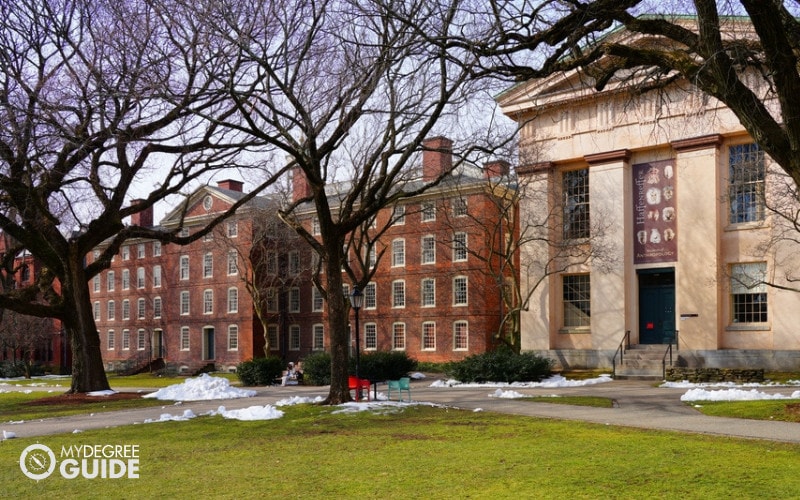Explore Online Speech Pathology Masters Programs for 2024. Compare online SLP master’s programs to see which is best for you!

Communication skills help people connect with one another. When speech is hindered, communication becomes more difficult.
Speech-language pathologists have opportunities to help people improve their communication skills and, as a result, their ability to connect with others. They are also able to assist people with other daily challenges, such as swallowing disorders.
Editorial Listing ShortCode:
Whether you choose to focus your career on communication skills or swallowing therapy, you’ll be joining a potentially rewarding, growing field. Speech-language pathology jobs are expected to increase by 25 percent for the next 10 years.
To prepare for this important profession, look into earning a master’s degree in speech pathology online.
List of Colleges that Offer a Master’s Degree for Speech Pathology Online
The following school list is in alphabetical order. To be included, a college or university must be regionally accredited and offer degree programs online or in a hybrid format.
1. Baylor University
Established in 1845, Baylor University is a privately run university affiliated with the Baptist Church. They are located in Waco, Texas and were originally founded by the last Congress of the Texas Republic.
This makes them the oldest tertiary-level institution in the state. Their main urban campus is 1,000 acres and serves over 17,000 students.
- Master’s in Communication Sciences and Disorders
Baylor is accredited by the Southern Association of Colleges and Schools Commission on Colleges.
2. California State University – Northridge
California State University at Northridge dates back to 1972, after the old San Fernando State Valley School was restructured and integrated into the State’s public university system.
They serve over 38,000 students on their main campus, located in a residential suburb of the city of Los Angeles and are one of the most diverse public universities in the country.
- Master’s in Communicative Disorders
CSU Northridge is accredited by the WASC Senior College and University Commission (WSCUC).
3. East Carolina University
East Carolina University is one of the leading public research institutions in the State of North Carolina. They date back to 1907, although they were originally founded as a teacher training school.
Their three main campuses are located in the city of Greenville. This includes a 530-acre main campus, the West Research Center, and a Health Sciences complex.
- Master’s in Communication Sciences and Disorders
ECU is accredited by the Southern Association of Colleges and Schools Commission on Colleges.
4. Florida State University
Florida State University is a public research-focused university in possession of both a sea and a space grant. They are located in Tallahassee, where they were founded in 1851.
They currently serve over 40,000 students and employ almost 6,000 faculty members. U.S. News & World Report has ranked this university as the 19th best public university.
- Master’s in Communication Science & Disorders
FSU is accredited by the Southern Association of Colleges and Schools, Commission on Colleges (SACSCOC).
5. Idaho State University
Located in the small college town of Pocatello, Idaho State University is a public institution that dates back to 1901. It is now one of the leading universities in its state, and it serves over 12,000 students.
At their 1,000-acre campus, they offer a superb student-teacher ratio of 17:1 and 56 different student clubs.
- Master’s in Speech-Language Pathology
ISU is regionally accredited by the Northwest Commission on Colleges and Universities.
6. James Madison University
James Madison University is a public university located in Harrisonburg, Virginia. They date back to 1908, although they were originally established as an Industrial School for Women.
Their main campus encompasses 721 acres of developed land, two certified historical landmark buildings, and a new Recreation Center. It currently serves 22,667 students.
- Master’s in Speech-Language Pathology
JMU is accredited by the Southern Association of Colleges and Schools Commission on Colleges.
7. New York University
New York University is one of the largest and more prestigious private universities on the U.S.’ East Coast. They date back to 1831 and currently serve over 50,000 students. Most of them are enrolled in the main Manhattan campus, but they have extension centers in all five continents.
They are ranked as the 29th best-ranked university in the world by U.S. News & World Report.
- Master’s in Speech-Language Pathology
NYU is regionally accredited by the Middle States Commission on Higher Education.
8. Nova Southeastern University
Nova Southeastern University is located in the small city of Davie, Florida. This is a small and private institution, which was originally established in 1964.
Their suburban campus encompasses 480 acres and offers classrooms and housing for over 20,000 students. They also maintain regional campuses in North Miami and Tampa.
- Master’s in Speech-Language Pathology
NSU is accredited by the Southern Association of Colleges and Schools Commission on Colleges (SACSCOC).
9. Texas Woman’s University
Despite its name, the Texas Woman’s University is a public, coeducational institution with a strong presence across Texas. They were founded in 1901 in Denton, Texas, where they serve over 12,000 students. They also have satellite campuses in Dallas and Houston.
Although they began accepting men in 1994, they remain the largest primarily female state university in the country.
- Master’s in Speech-Language Pathology
TWU is accredited by the Southern Association of Colleges and Schools Commission on Colleges.
10. University of Akron
The University of Akron is located in the city of the same name, in western Ohio, They were established in 1870 as Buchtel College, and they were originally affiliated with the Universalist Church. However, they are now state-run and integrated with the state’s university system.
They have over 16,000 students, a 218-acre campus, and a highly renowned basketball team.
- Master’s in Speech-Language Pathology
UA is accredited by the Higher Learning Commission.
11. University of Montana
This public university is based in the town of Missoula, Montana and dates back to 1893. They are the largest and most prestigious university of the Montana University System and currently serve over 10,000 students.
They are ranked as the fifth university in the nation in the production of Rhodes scholars (Wikipedia).
- Master’s in Speech-Language Pathology
UM is accredited by the Northwest Commission on Colleges and Universities (NWCCU).
12. University of Northern Colorado
The University of Northern Colorado is located in the municipality if Greeley. This is a relatively small public university, which was originally founded in 1889. Its suburban campus is divided into six colleges and currently serves over 12,000 students.
They have nearly 500 full-time lecturers and 595 doctoral candidates.
- Master’s in Speech-Language Pathology
UNC‘s accreditation was recently reaffirmed by the Higher Learning Commission in 2015.
13. University of South Carolina
Located in Columbia, South Carolina, the well-renowned UC dates back to 1801. This is the flagship institution of its state’s public university system. As such, it serves over 35,000 students and employs 1,600 faculty members.
They also have a well-developed network of adjacent feeder colleges and a top-of-the-line varsity football team.
- Master’s in Speech-Language Pathology
USC was most recently accredited by the Southern Association of Colleges and Schools Commission on Colleges (SACSCOC) in 2011.
14. University of St. Augustine
The University of St Augustine is a private university exclusively devoted to training graduate students. Their main campus is located in San Marcos, California, and it dates back to 1979. They also have satellite programs in Florida (Miami and St Augustine) and Texas (both in Dallas and Austin).
- Master’s in Speech-Language Pathology
USA is accredited by the WASC Senior College and University Commission.
15. Western Kentucky University
Western Kentucky University is a public university located in Bowling Green. It was founded in 1906, and it was originally founded by the Commonwealth of Kentucky.
They currently have over 20,000 students, over 770 full-time lecturers, and a sprawling suburban campus. They also have satellite campuses in Glasgow, Elizabethtown, and Owensboro.
- Master’s in Speech-Language Pathology
WKU is accredited by the Southern Association of Colleges and Schools Commission on Colleges.
What is Speech Language Pathology?

Speech-language pathologists are practitioners who use their scientific knowledge about communication and oral functions to help people overcome obstacles in their daily lives. Often, these professionals are responsible for helping people learn to form words and speak clearly, but that’s not all that they do.
Speech-language pathologists help with five primary areas of concern:
- Communication Disorders — Cognitive: Brain trauma can make it hard for people to clearly express their thoughts. Professionals can help people learn to speak intelligibly.
- Communication Disorders — Social: Speech pathologists can provide guidance about speaking appropriately with others. This can include choosing suitable topics and carrying on back-and-forth dialogue.
- Language Issues: When people have trouble saying or writing words in a way that others can comprehend, speech professionals can help. They can also help people learn to process others’ words.
- Speech Problems: Speech-language pathologists may be best known for helping people form sounds and words and put them together as fluent sentences.
- Swallowing Conditions: People who have trouble swallowing food or drinks, perhaps as a result of illness, injury or aging, can benefit from a speech-language pathologist’s therapeutic services.
Speech-language pathologists’ expert knowledge can help others find success in their interpersonal relationships and their daily activities.
SLP Master’s Program Curriculum

To earn an online master’s in speech pathology, students take a number of classes related to speech and swallowing processes.
Common topics of study include human anatomy, developmental disorders, and communication science. The coursework helps students build familiarity with speech disorders and learn ways to help people overcome these physical or cognitive challenges.
The courses that you take during your master’s studies may include:
- Early Childhood Language Disorders: From birth to age five, children develop many of their language skills, and related disorders can often be identified at this young age. This class can help you learn about these conditions and cover early interventions that can improve outcomes.
- Hearing Rehabilitation: Speech disorders and hearing loss often go together, so you’ll need to learn how to provide services for people with hearing impairments.
- Language Disorders in Older Children: As children begin school, social or literacy delays may become apparent. This class can help prepare you to address language issues among kids and adolescents.
- Speech and Swallowing Disorders Throughout the Lifespan: Speech-language pathologists help people of all ages. This class may cover disorders related to traumatic brain injuries, dementia, developmental delays, and illnesses.
- Working in Schools and Healthcare Facilities: This course provides information about laws, policies, and practices for providing services in common speech-language settings.
Most speech-pathology programs include clinical practicums. These clinical experiences are typically spread throughout the curriculum.
There are some nonclinical programs available for those who don’t intend to become certified speech pathologists. Keep in mind that a nonclinical track can limit your future career options, so consider carefully whether that’s the right approach for you.
Some programs include an optional or required thesis. This research project provides an opportunity to apply what you’ve learned and dive deep into a subject that interests you. On the other hand, completing a thesis may mean that it takes longer to finish your graduate program.
Online SLP Admissions

To enroll in a master’s program, you must first earn a bachelor’s degree. It is ideal if your bachelor’s degree is in a field related to speech-language pathology. If not, you may need to take some prerequisite classes before you can start your master’s studies.
Classes in anatomy, statistics, language, and audiology can help provide you with some of the foundational knowledge that will be essential to your graduate-level study of speech-language pathology.
Additional admissions requirements may include:
- Completed application and fee
- Essay or other personal statement
- Letters of reference from professional or academic sources
- Resume or curriculum vitae
- Transcripts from your bachelor’s degree or other academic programs
- Exam scores from the GRE (if required)
Not all schools require prospective students to take the GRE. Students’ scores on this test are not always indicative of future success in grad school, so some universities opt not to consider them at all.
Others do factor GRE scores into their admissions decisions but also grant waivers for qualified students with professional experience, high undergraduate GPAs or previous graduate work.
Careers & Salaries

Most speech-language pathologists are certified clinical practitioners who work with patients in a variety of settings. Hospitals, medical clinics, schools, early childhood programs, and residential facilities are common worksites for these professionals.
Speech therapists may work with kids, people with developmental disabilities, patients with injuries and illnesses, or senior citizens. Many therapists focus on a specialty, such as feeding skills, audiology or speech fluency.
A clinical practitioner’s responsibilities may include:
- Identifying speech or language concerns
- Implementing treatment plans
- Providing feeding or swallowing therapies
- Encouraging fluency skills
- Coordinating with healthcare and education professionals to provide well-rounded care for clients
- Researching communication disorders and developments
- Supervising employees in a clinic or practice
Most speech-language pathologists earn between $49,840 and $121,260 each year. The number of jobs in this field is expected to grow significantly more quickly than the national average over the next decade. So, many professionals find that entering a career in speech pathology is worth it.
Some people with training in speech therapy choose not to become certified clinical practitioners. Instead, they may work in various industrial settings. For example, their expertise could be useful in a company that manufacturers hearing devices or feeding instruments.
Other speech-language pathologists work in academia. They may become professors or researchers. On average, postsecondary educators earn $79,540 annually. This field is expected to experience a 9% growth rate.
Online SLP Program Accreditation

For any course of study, you should always choose an accredited college, particularly one with regional accreditation. This certification must be granted by one of the country’s CHEA-recognized regional accrediting agencies.
These include:
- Middle States Commission on Higher Education (MSCHE)
- New England Commission of Higher Education (NECHE)
- Northwest Commission on Colleges and Universities (NWCCU)
- WASC Senior College and University Commission (WSCUC)
To earn regional accreditation, schools must meet general standards of educational excellence. This is important so you know that your tuition fees are going toward quality academics. Regional accreditation is also necessary so that you can qualify for federal financial aid and transfer your credits to another school.
In the field of speech-language pathology, there’s another type of degree accreditation that you need to look for as well. In order to become a certified professional, you must attend a graduate school with a speech-language pathology program that is approved by the American Speech-Language-Hearing Association (ASHA).
The branch of the organization that provides this accreditation is the Council on Academic Accreditation in Audiology and Speech-Language Pathology (CAA), so this is often referred to as “CAA accreditation.”
Can I Get My Master’s in Speech Pathology Online?
Many schools offer online paths to earning a master’s degree in the field of speech pathology. Both MA and MS programs are available.
Accredited online programs offer comparable content, instruction, and assignments to their on-campus counterparts.
How Long Does It Take to Get an Online Speech Pathology Masters?
Most full-time students complete speech pathology master’s programs in about two years.
This can vary based on the structure of your university’s academic calendar. In general, though, you should expect your online SLP program to be at least this long since you’ll need time to complete your clinical practicums.
How Do You Become a Speech Pathologist?
Becoming a practicing speech pathologist requires earning a graduate degree in the field and becoming licensed.
Here’s what a typical path to a career in speech-language pathology might look like:
- Earn a bachelor’s degree and take essential prerequisite courses.
- Apply to master’s programs with CAA accreditation.
- Complete an accredited master’s program that includes 400 clinical hours.
- Pass the Praxis Examination in Speech-Language Pathology.
- Complete a 1,260-hour Clinical Fellowship (CF).
- Apply for the Certificate of Clinical Competence (CCC-SLP).
- Obtain additional licensure as required in your state.
- Maintain your certification with continuing education.
What is ASHA?
The American Speech-Language-Hearing Association (ASHA) is a professional organization oversees people and practices in this field.
ASHA bestows the Certificate of Clinical Competence (CCC-SLP) on qualified professionals. In some states, this certification is optional for working as a speech-language pathologist, but other states require it for licensure.
What is the Difference Between a Speech Pathologist vs Speech Therapist?

Many people use the terms “speech pathologist” and “speech therapist” interchangeably. “Speech pathologist” is the more common term among professionals.
In general, though, there’s not a formal distinction between the two titles.
What is the Difference Between a Speech Pathologist and an Audiologist?
Although speech-language pathology and audiology are related fields, there are distinctions between the two.
Speech-language pathologists:
- Assist with communication and language issues
- Need a master’s or doctorate
- Can make over $79,000 per year
- May work in schools, medical settings and group homes
Audiologists:
- Assist with hearing and balance issues
- Need a doctorate
- Can make over $77,000 per year
- Often work in healthcare settings, hearing clinics and schools
If you’re interested in both fields, you could look for a speech-language pathology master’s program with a concentration in audiology.
Can You Be a SLP (Speech Language Pathologist) Without a Masters?
An important thing to know about how to become a speech language pathologist is that you must have a graduate degree. This can be a master’s degree or a doctorate.
A bachelor’s alone is insufficient for pursuing licensure in this field. There are online SLP master’s programs if you need more flexibility.
Are There Any Online Speech Pathology Masters Programs no GRE?
The field of speech-language pathology needs an increasing number of trained professionals.
To reduce obstacles that might keep talented people from entering this line of work, a growing number of schools have online speech pathology masters programs no GRE required for admission.
Instead, colleges may consider other qualifications, such as work experience, bachelor’s GPA and professional recommendations.
For example, Nova Southeastern University does not require GRE scores for their online masters in speech pathology program.
What is a Good GRE Score for Speech Pathology?
For schools that require GRE scores, try to achieve a combined score of at least 295 on the verbal and quantitative portions of the test and a 3.5 on the analytical writing part.
If your scores are lower, look for universities with GRE waivers or no GRE requirements.
What Can I Do with a Masters in Speech Language Pathology?
After earning your master’s in speech-language pathology, you could work with children, the elderly, or people with disabilities or injuries.
Your skills could help people become more fluent communicators or learn to safely swallow food and drink. You might work for a school, a medical facility or a home-health organization.
Conclusion

Imagine if you couldn’t speak or swallow well. Your struggles would likely affect your relationships and your quality of life. You’d want a caring, knowledgeable person to help you overcome those problems.
As a speech-language pathologist, you could fill that role for many people. As the population ages, the demand for trained professionals is growing. Whether you want to work with children or adults, your training in communication science can help prepare you for a secure, profitable career through which you can make a real difference in others’ lives.
To get started, pursue your masters in speech pathology online from an accredited online school.
Related Guides:
